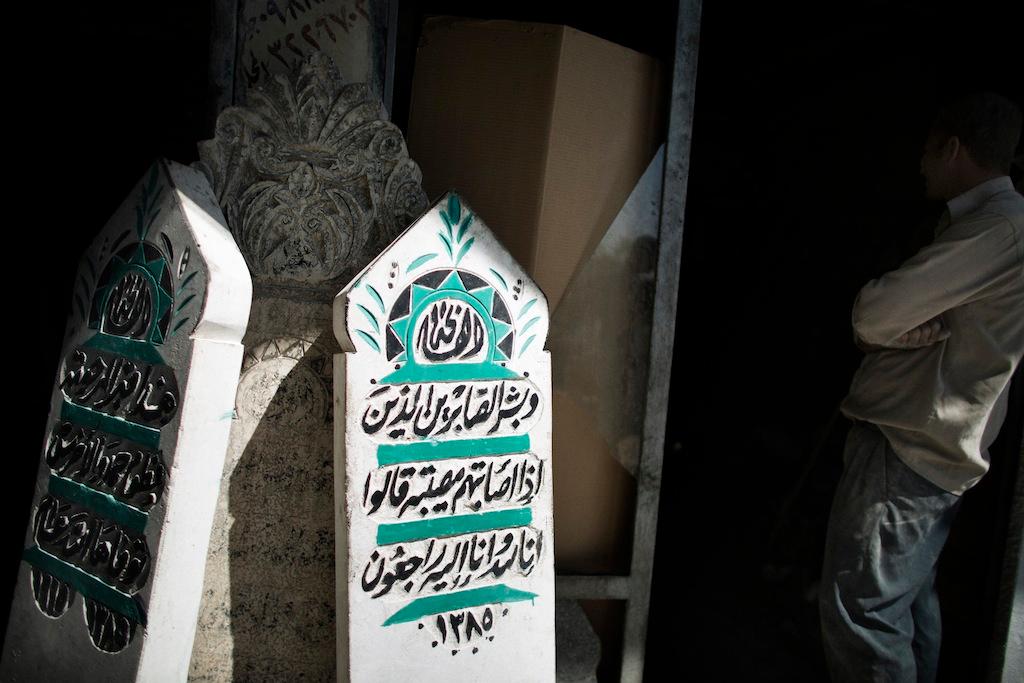Aleppo execution: At least 65 found dead, says rights group
A worker at a tombstone workshop waits for customers on Sept. 16, 2012, in the city of Aleppo.
REYHANLI, Turkey — A Syrian pro-opposition group has reported at least 65 people were found dead in the northern Syrian city of Aleppo on Tuesday.
The bodies were found in the area of Bustan al-Qasr, which was captured by the Free Syrian Army last year and is still held by the rebels. The river that passes through the area runs through government held territory further up stream.
Video taken by activists at the scene show rows of bodies covered in mud. Each have hands bound in front of them and they appear to have gunshot wounds to the head.
According the UK-based Syrian Observatory for Human Rights, which tracks the death toll on both sides of the conflict, the men are aged between 20 and 30 years. In a statement released earlier today, the Observatory said they expected the death toll may be as high as 80.
Seventeen of the 65 bodies have been identified so far, but their identities have not been released, the grou said.
Syrian activist and university professor Adbul Aziz Agini said the style of killing indicated the men were prisoners of some kind.
“With previous massacres of civilians, the victims are generally not bound. They are simply shot or slaughtered in front of their houses,” he told GlobalPost, referring to the dozens of instances where mass bodies have been discovered over the course of the Syrian conflict. “The binding of the wrists and the way of killing is a style the regime uses for soldiers, possibly defectors.”
Agini said such executions have occurred in the past when news of mass defections has filtered through to government officials.
Rights groups accused both the regime and opposition forces, however, of carrying out summary executions of prisoners. Video footage of such executions, as well as the recovery of bodies, appears to implicate both sides.
“As the conflict escalates we are going to have these things,” Agini said. “It’s an arm twisting war. Everyone is desperate to break the backbone of the other. The conflict has gone on far longer than either side anticipated. As everyone struggles for victory, the battle becomes more fierce"
This is the latest in a string of massacres that have taken place across Syria since the uprising began almost two years ago.
Massacres involving civilians, often entire families, have also taken place across the country. In every case, a string of propaganda and finger pointing follows. The Syrian government blames the rebels and Al Qaeda-linked groups operating in Syria. The rebels blame government forces and civilian militia groups on the government pay roll.
Perhaps the most shocking of these mass murders took place on May 25, 2012 in the town of Houla, where 108 civilians were slaughtered with knives and light weapons. Among them, 34 women and 49 children were killed.
The Syrian government claimed that Al Qaeda terrorist groups were responsible for the killings, but a UN report released in August pointed toward government forces.
According to the investigation, the victims were Sunni and affiliated with rebel forces. Victims and witnesses repeatedly blamed government militia groups. However, access to crime scenes and fear among victims of retribution make the perpetrators difficult to pinpoint.
The Syrian Observatory wrote on their Facebook page:
"Aleppo city: Tens of unidentified bodies of young men were found on the bank of the Quweiq river, several had their hands tied and most seem to have been summarily executed by close-range gunshot to the head."
Syria's civil war has killed around 60,000 people since it began 22 months ago.
Meanwhile, US President Barack Obama on Tuesday pledged further humanitarian aid for Syria, announcing an additional $155 million for Syrian civilians and refugees, which brings the total fo America's aid to $365 million to date.
The aid will go toward food, clean water, medication and treatment, according to the White House. It will also provide clothing, winter supplies, vaccinations and care for victims of sexual violence.
As the death toll continues to rise, some have called for US military intervention.
“In a situation like Syria, I have to ask, can we make a difference in that situation? Would a military intervention have an impact?” Obama told the New Republic Magazine in a recent interview.
“How would it affect our ability to support troops who are still in Afghanistan? What would be the aftermath of our involvement on the ground? Could it trigger even worse violence or the use of chemical weapons?” he asked.
The US has called for President Bashar al-Assad to step down, but has stopped short of supplying weapons to the rebels.
Watch Obama's statement to the people of Syria, released on Tuesday by the White House:
Every day, reporters and producers at The World are hard at work bringing you human-centered news from across the globe. But we can’t do it without you. We need your support to ensure we can continue this work for another year.
Make a gift today, and you’ll help us unlock a matching gift of $67,000!
